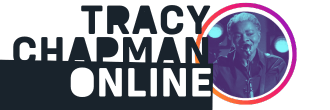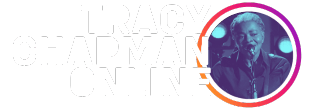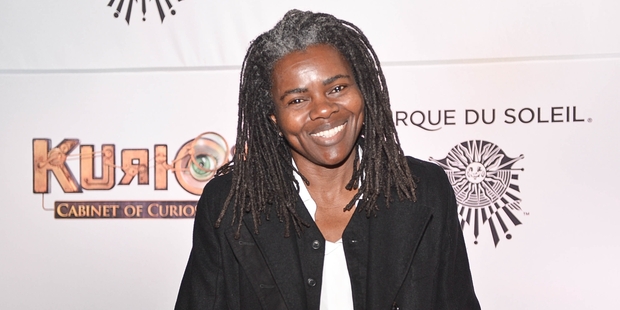By Glyn Brown, The Independent, Oct 11, 2002
Tracy Chapman shot to stardom in 1988 when her appearance at Nelson Mandela’s birthday concert was televised worldwide. That completed her journey from bullied, bookish schoolchild to protest songwriter. So, asks Glyn Brown, is she still talking revolution?
11 October 2002
Tracy Chapman is back in the ring. Which will come as a surprise to many, because it seemed she’d thrown in the towel. In fact, she has been turning out albums at a relatively regular pace (five so far); the low profile may be the result of a certain lack of definition, one recording following another with no real new territory explored, plus Chapman’s own huge reluctance to use the press. Last year, however, Collection, a round-up of her most notable tracks, appeared. It was a shock; first as a reminder of how poignant and powerful her music can be, then in the sales, which were almost instantly multi-platinum. Now, a new release is ready, produced by Polly Harvey’s cohort John Parrish. The thing Chapman undoubtedly needs at this point, if she’s to move on, is edge. What might Parrish contribute to her gently passionate manner?
Two difficulties await the journalist. One, there have been few interviews with the wary Chapman, and in those that exist she rears back from personal questions as if they were serious assault; the Howard Hughes of rock, she’ll discuss anything but herself. Two, consistent with this mode of privacy, no one gets to hear the album until an hour before the interview.
Out at the studio, in foggy Sausalito, where the album Let It Rain is being mastered, there’s relief on the listen-through; a dark, serrated quality, some tracks faux-jaunty, pedal steel and accordion giving a country feel, others yearning with string quartets. Chapman’s deep alto is grazed and breathy, a strange mix of Natalie Merchant and Marianne Faithfull. And here’s the singer, long dreadlocks around an incredibly pretty face, all forehead and sweeping cheekbones. She makes herself a herbal tea and we adjourn to the mixing-room.
Now 38, Chapman grew up in Cleveland, Ohio with her mother and older sister, her dad having walked out when she was four. She was keen on animals, playing music and books. She and her sister Aneta were almost Brontë-esque, turning out armfuls of poems and stories. So, she was a serious child?
“Pretty serious, but I grew up in a rough neighbourhood and my mother was a little overprotective. The one place we were allowed to go on our own was the public library, and we spent all our time there. I’d get books home and try to figure out what they were about.”
The kind of studiousness that makes you no one’s friend. Was Chapman bullied? “Oh, yeah.” She examines her nails. “Early on, I didn’t fit in with the other kids, and much of that was because they thought I was bookish, a goody-two-shoes type.” Awkward laugh. “Teacher’s pet. It just makes you read more, y’know – what else can you do? No one wants to hang out with you.”
There were other aspects to Cleveland that made it uncomfortable. A northern town, its neighbourhoods weren’t segregated but the schools still were, which involved bussing. “It’s an old industrial town, and when I was growing up it was very economically depressed because the steel industry and the rubber plants were closing, and the auto factories were downsizing. And it was a dirty city, very toxic because of the industrial waste. Culturally, it was diverse, and our neighbourhood was pretty integrated. And then the white families started to leave… There was always tension.”
And if you’re sensitive, you pick up on it. “Yeah. But it wasn’t subtle. It felt like the kind of racism people assume existed in parts of the South in the late Sixties, in that you’d go to a public pool and there’d be a sign saying ‘Whites only’.”
At 16, however, the education programme “A Better Chance” got Chapman a place at the private, politically enlightened Wooster school in Connecticut, where the yearbook has her billed as the student “most likely to marry her guitar”. She went from there to Tufts University in Boston, where, apart from studying anthropology, she played in clubs and bars. In a ridiculously fortuitous break, she was spotted busking by a fellow-student whose father ran the record label SBK; she met the man, he called up Elektra, and Chapman found herself with a deal. At 24, her first record ready to go, she performed at Wembley for the Nelson Mandela 70th-birthday concert in 1988, televised worldwide. The impact was instant. At 3.05pm she was unknown; by around 6pm, she’d gone supernova. And thus we had our first – possibly only – black protest folk singer. The album, Tracy Chapman, hauled in awards and still sounds startlingly good, from “Talkin’ Bout a Revolution” to “Fast Car” to “Baby, Can I Hold You”, that story of waiting for romantic commitment that never comes. And Chapman’s two-pronged agenda was set: analysis of disenfranchisement and powerlessness, politically and personally.
Through the next few albums – Crossroads, Matters Of The Heart and New Beginning, which came with a packet of seeds in a handy metaphorical gesture – themes of racial conflict, unequal opportunity and working to improve your life burst forth. But who exactly is Chapman talking to? Does she, for example, have a black audience?
“I’m just putting it out there. I don’t think it’s helpful to try to figure out…”
All right. Then how might her ideal new world be different, or better? Would there be some morality?
“That would be one thing. And people would have more choice. Some might say it’s dangerous to let everyone make their own decisions, but that freedom’s essential to a good life. Though some people would rather let others decide how they live.”
I’m not sure what this means. Freedom of choice pretty much comes down to money. Also, greed and materialism aren’t the prerogative of big conglomerates. Do people want intellectual liberation, or do they just want “stuff”?
“Some people do, but I also think that’s what they’re told to want.” She considers for a minute, then mentions the shift from a rural lifestyle to an urban one. “We’ve gone from the small community where everyone knows you to this anonymous mass of people with no connections. And… what d’you do? Any loneliness or disconnection people feel is exploited by companies who decide you can fill the space in your life with things. And it’s then not about the relationships you make, but what you have.”
Good point, well made – as neat an encapsulation of our marketing-obsessed culture as you might want. A song, “Hard Wired”, on the new album follows up the exploitation theme, this time on grotesque TV shows. “I know people volunteer. But there’s a sense now that being famous – and it doesn’t matter how – is important, and will make your life better, and so people are willing to humiliate themselves. Most of what you see portrays people at their worst. And when you think what’s behind it, all the money that’s made and spent, it’s…” She clutches her forehead with a laugh that’s self-effacing, almost nervous.
And yet, despite seeing the best in people, or trying to, Chapman clearly hasn’t always had the best of them and is, as we know, often ill at ease with others. Two years ago, she spoke of anxiety during a tour, when audience members jumped on the stage. Now she says, “The experience of performing can be a joy, but it can be terrifying, too, because there’s this mass of people in front of you. And they really have more power than those onstage.” For that moment. “Yes. But if emotions change, it can get dangerous pretty quickly.”
And then there’s love. Chapman has written some of the most moving love songs going, yet in almost all of them she gives her heart to someone who won’t respond, or who lets her down. In the new track “Happy”, however, she’s the one who can’t commit (that is, if the song’s about her). Has she been hurt that badly? Or maybe, in truth, she really is kind of happy now?
She buries her face in an ecstasy of shyness. “I’m currently kind of happy.”
Whether that means she’s happy with someone or happy alone, the lyric looks at those who are offered love but just aren’t able to believe it.
“Yeah. And also they don’t recognise it, because what you see represented as love in the media is so false, it’s all scripted, violins and whatever, and has nothing to do with reality. So if they’re not experiencing that, then they don’t see what they have.”
As ever, Tracy is considering troubled emotion in the world at large, not in herself, or disappointing partners. But it isn’t a device. She seems genuinely compassionate, idealistic but realistic: qualities as rare as hen’s teeth in rock, or anywhere.
Tracy Chapman – it might be time to look again, and see what we have.
‘Let It Rain’ is released on 14 October


